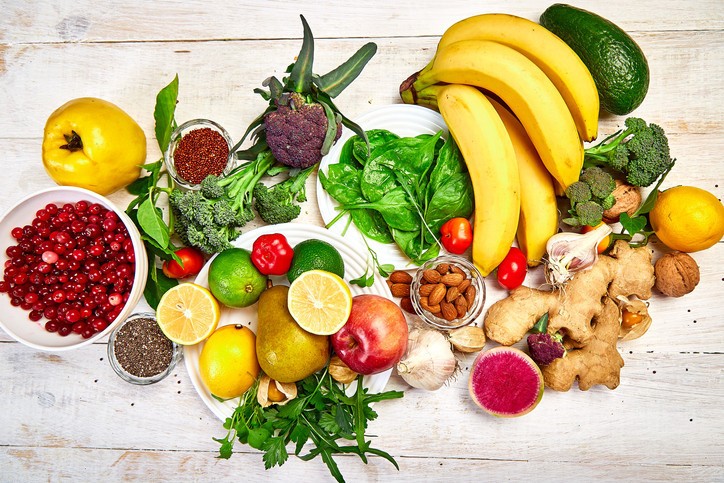Vitamins and minerals are vital for maintaining optimal health, supporting bodily functions, and protecting against diseases. While often mentioned together, they are distinct: vitamins are organic compounds from plants or animals, while minerals are inorganic elements from the earth. Understanding What Foods Contain these essential nutrients is crucial for a balanced diet.
Understanding Vitamins and Minerals
Vitamins are organic substances, and with the exception of vitamin D, the body cannot synthesize them. This means they must be obtained through diet. Minerals, on the other hand, originate from the earth and are absorbed either directly or indirectly through plants and animals.
Water-Soluble vs. Fat-Soluble Vitamins
Vitamins are categorized into two groups based on their solubility:
- Water-soluble vitamins: These include the eight B vitamins (B1, B2, B3, B5, B6, B7, B9, and B12) and vitamin C. The body excretes any excess amounts of these vitamins.
- Fat-soluble vitamins: These include vitamins A, D, E, and K. Excess amounts are stored in the liver and fatty tissues.
Major vs. Trace Minerals
Minerals are also divided into two groups:
- Major minerals: These are required in larger amounts by the body. Examples include calcium, chloride, magnesium, potassium, and sodium.
- Trace minerals: These are needed in smaller amounts. Examples include chromium, copper, fluoride, iodine, iron, manganese, selenium, and zinc.
While major minerals are present in larger quantities, both major and trace minerals are essential for health.
Top Food Sources of Vitamins
Knowing what foods contain specific vitamins can help you plan a nutrient-rich diet.
Water-Soluble Vitamins: What Foods Contain Them?
-
Vitamin B1 (Thiamin): Ham, soymilk, watermelon, and acorn squash are good sources.
-
Vitamin B2 (Riboflavin): Milk, yogurt, cheese, and enriched grains are excellent sources.
-
Vitamin B3 (Niacin): Meat, poultry, fish, fortified grains, mushrooms, and potatoes.
-
Vitamin B5 (Pantothenic Acid): Chicken, whole grains, broccoli, avocados, and mushrooms contain vitamin B5.
-
Vitamin B6 (Pyridoxine): Meat, fish, poultry, legumes, tofu, soy products, and bananas.
-
Vitamin B7 (Biotin): Whole grains, eggs, soybeans, and fish are good options.
-
Vitamin B9 (Folate): Fortified grains, asparagus, spinach, broccoli, legumes like black-eyed peas and chickpeas, and orange juice.
-
Vitamin B12 (Cobalamin): Meat, poultry, fish, milk, cheese, fortified soymilk, and cereals are primary sources.
-
Vitamin C (Ascorbic Acid): Citrus fruits, potatoes, broccoli, bell peppers, spinach, strawberries, tomatoes, and Brussels sprouts.
Fat-Soluble Vitamins: What Foods Contain Them?
-
Vitamin A (Retinol): Beef liver, eggs, shrimp, fish, fortified milk, sweet potatoes, carrots, pumpkins, spinach, and mangoes.
-
Vitamin D (Calciferol): Fortified milk and cereals, and fatty fish like salmon.
-
Vitamin E (Tocopherol): Vegetable oils, leafy green vegetables, whole grains, and nuts.
-
Vitamin K (Phylloquinone): Cabbage, eggs, milk, spinach, broccoli, and kale.
Top Food Sources of Minerals
Understanding what foods contain various minerals is equally important.
Major Minerals: What Foods Contain Them?
-
Calcium: Yogurt, cheese, milk, salmon, and leafy green vegetables.
-
Chloride: Primarily obtained from salt.
-
Magnesium: Spinach, broccoli, legumes, seeds, and whole-wheat bread.
-
Potassium: Meat, milk, fruits, vegetables, grains, and legumes.
-
Sodium: Salt, soy sauce, and vegetables.
Trace Minerals: What Foods Contain Them?
-
Chromium: Meat, poultry, fish, nuts, and cheese.
-
Copper: Shellfish, nuts, seeds, whole-grain products, beans, and prunes.
-
Fluoride: Fish and teas.
-
Iodine: Iodized salt and seafood.
-
Iron: Red meat, poultry, eggs, fruits, green vegetables, and fortified bread.
-
Manganese: Nuts, legumes, whole grains, and tea.
-
Selenium: Organ meat, seafood, and walnuts.
-
Zinc: Meat, shellfish, legumes, and whole grains.
Building a Balanced Diet
Rather than focusing on specific numbers and minimum daily amounts, a well-rounded, healthy diet is the most effective way to ensure you’re getting a variety of vitamins and minerals. Emphasize fruits, vegetables, whole grains, beans, legumes, low-fat protein, and dairy products. By prioritizing whole, unprocessed foods, you can naturally meet your daily needs for these essential nutrients. Knowing what foods contain different vitamins and minerals is the first step toward a healthier you.
